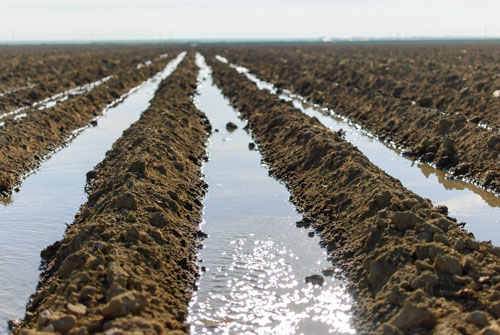
Leaching is the process of extracting substances from a solid material by dissolving them in a liquid, either naturally (rainfall) or through irrigation. Leaching can be beneficial for crops because it transports minerals from topsoil down to roots. However, leaching can also be harmful for plants if it removes too much of the essential nutrients (nitrogen), from the soil. This can lead to nutrient deficiency, poor plant growth, and reduced crop yield.
Here are top benefits that soil leaching provides
- Salt leaching. A process of flushing harmful salts lower down in the soil (past root zone). This is a common practice in orchards which have irrigation systems installed. Intentional soil leaching is usually done during orchard dormancy.
- It prevents nutrient accumulation and toxicity, which can affect plant quality and soil microorganisms.
- Leaching can help improve soil quality and fertility by adding nutrients and organic matter to the soil. For example, composting is a form of leaching that breaks down organic waste into humus, which enriches the soil and helps retain moisture.
Drawbacks
As noted in the previous paragraph, soil leaching can provide farmers with significant benefits. But it has a flip side as well, here are top three drawbacks of soil leaching:
- It can cause soil erosion and loss of topsoil by washing away the fine particles that hold the soil together. This can reduce the productivity and biodiversity of the land and increase the risk of landslides and flooding.
- Leaching can also contaminate groundwater and surface water by carrying pollutants such as pesticides, fertilizers, metals, and salts into the water sources. This can affect the quality and availability of water for human and animal consumption, irrigation, and recreation.
- It can alter the natural balance of nutrients and minerals in the soil and water, which can affect the growth and health of plants and animals. For example, acid rain is a form of leaching that lowers the pH of the soil and water, making it more acidic and less hospitable for some organisms.
Ways to prevent or minimize undesirable soil leaching
Here are some tips for farmers:
- Apply fertilizers in small doses rather than in one large application. This can help reduce the amount of nutrients that are washed away by water.
- Use organic fertilizers or compost instead of synthetic fertilizers. Organic fertilizers release nutrients slowly and are less likely to leach than synthetic fertilizers.
- Add organic matter to the soil regularly. Organic matter can improve the soil structure, increase water retention, and enhance nutrient availability.
- Use mulch or cover crops to protect the soil surface from erosion and evaporation. Mulch or cover crops can also prevent weeds from competing with the plants for nutrients and water.
- Choose plants that are adapted to your soil type and climate. Some plants can tolerate low-nutrient soils better than others, while some plants can absorb nutrients more efficiently than others.
Soil leaching is a natural phenomenon that can have both positive and negative effects on plants. By understanding what causes soil leaching and how to prevent it, you can improve your soil quality and plant health.
We just covered the benefits and drawbacks of soil leaching. While there are things that farmers cannot control there are many things which they can. In order to make well informed decisions, farmers can use farm management software to monitor and optimize their irrigation practices, as well as apply soil amendments, conditioners and residue management. Farm management software can also help farmers to track their crop progress, weather conditions, disease risks, machinery data and profitability.
If you are exploring farm management software option, please try AgNote. You can register today for a free seven-day trial, and take AgNote for a test spin!